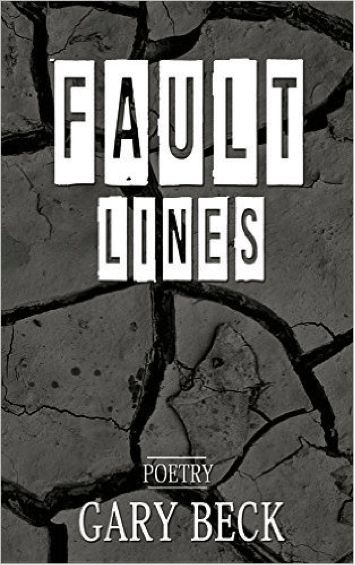Gary Beck, Fault Lines
reviewed by Alison McBain

Fault Lines Publisher: Winter Goose Publishing Date: November 2, 2016 Paperback: 124 pages ISBN: 1941058558; 9781941058558 Price: $10.99 |
I’ve reviewed several of Gary Beck’s collections of poetry, and I find his style of writing tends to be brief, yet full of phrases that are unique and capture my attention as a reader. Often, the subject matter of his poetry is dark, whether it is looking at the state of the world, the supposed future based on current trends, or the political and social climate in the United States and abroad. Often, the collections explore topics from the environment to human society, from the way people affect the world around them to the way the world affects people.
Overall, the conclusion drawn in the poems is that of a bleak future. And yet, often, there are glimpses of hope, although they may be few and far between.
I feel that Mr. Beck’s new collection of poetry, Fault Lines, seems to lean more towards bleakness than hope. Perhaps it is based on the time it was published, a time when the United States has been the most divided in recent political history. Perhaps the poems feed off the current climate of terrorism, bombings, and beheadings. Whatever the case, I found that the darkness of Mr. Beck’s poems have grown darker; the glimpse of hope has become almost submerged beneath an overpowering sense of helplessness, hopelessness and futility. The world is being destroyed, and there is little to do to stop it.
Many of the poems are short, around ten lines or less. There are a few many-paged pieces as contrast, one prose poem, and a couple of rhymed ones.
Some common topics of the cause of destruction include war, especially the Iraq War; the damaging of the environment through pollution, greed and neglect; the haves versus the have-nots; political corruption; child soldiers; farmers turning from growing food to growing fuel; starvation; and homelessness. These poems are told from an American perspective, and America is both held accountable and condemned by the poet for their part in this wholesale destruction.
Mr. Beck doesn’t hesitate to look the toughest situations in the eye and not blink, such as when he speaks of warfare committed through children in “Elegy to the Child Soldier.”
In the still protected USA
we are shocked at a child killer
and cannot conceive of children
burning other children alive,
pounding babies to death in mortars,
as if they were grinding grain.Children are exploited
by cruel thugs and criminals,
and automatic rifles
become toys for child’s play.
Suddenly a twelve-year old
is a dangerous weapon.
This is both graphic and unapologetically facing the brutal reality of warfare head-on. The last line, in particular, resonates — a child turned into a weapon. How does one disarm a living weapon? The conclusion is that there is no answer on how to stop this from happening, and no answer on how to fix the problem when there is a universal lack of global support.
Despite the mostly drear subject matter, there is some beautiful language incorporated into many of these poems, such as in “Urban Sorrow.”
The light of day wearily subsides
fatigued by man’s abuses.
Intruding beams from street lamps
sing illusion songs of safety.
The language and tone of this poem wonderfully reflects the subject matter. The sibilant “s” repeated throughout the poem reminds the reader of soft sounds, the gentle “shush” of a bedtime lullaby, of a day — or a person — winding down into silence.
There are a few spots of humor thrown in to alleviate the feeling of hopelessness that pervades the rest of the collection. For example, in “Winter of Discontent,” there is a tongue-in-cheek commentary on the reversal of traditional gender roles.
I am a restless man
pacing the dark hallway,
exiled from the dining room
where the women play cards,
the men toil in the kitchen
mumbling consoling jokes
as they wash the dishes.
This spot of humor was a nice contrast to the heavier subject matter of the collection, and while it did still provide some social commentary about the changes in male-female dynamics, the lightness of tone avoided some of the heavy-handedness of the more melancholy verses.
Mr. Beck is a talented poet, and I enjoyed reading his collection, as I usually do. However, I would have liked to see a little more diversity in subject matter and tone. I felt that the usual breadth of his themes was narrower than previous poetry collections I’ve read by him, and that it created more of a uniform feel for the overall work. But the language was beautiful and unique, and the poems face the hardest subjects head-on. I believe that this is his greatest strength as a writer — not to blink when confronted with the problems in the world but to illuminate them with his unique voice. It is hard to do this accurately without glossing over the problems, but he does it with grace. I hope you enjoy reading Fault Lines, as I did.
Copyright © 2017 by Alison McBain

